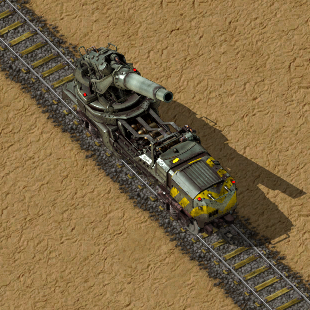Artillery wagon: Difference between revisions
(0.16) |
m (note about moving) |
||
| Line 4: | Line 4: | ||
In automatic mode, when the train isn't moving, the artillery wagon will automatically scan for enemy buildings (biter nests and worms) and shoot at them. Tragets can be manually designated by clicking on the ground (or the map) using an [[artillery targeting remote]]. For each click, an artillery wagon in range will fire once at the target. Firing at the biters from far away isn't all consequence free, as they will run to the wagon and try to attack it. | In automatic mode, when the train isn't moving, the artillery wagon will automatically scan for enemy buildings (biter nests and worms) and shoot at them. Tragets can be manually designated by clicking on the ground (or the map) using an [[artillery targeting remote]]. For each click, an artillery wagon in range will fire once at the target. Firing at the biters from far away isn't all consequence free, as they will run to the wagon and try to attack it. | ||
The artillery wagon can fire while stopped at a train stop, but '''not''' when stopped at a red signal. When a train with an artillery wagon is stopped at a train stop, aiming and shooting counts as activity for the purposes of "X seconds of inactivity" departure conditions in the train's schedule. | The artillery wagon can fire while stopped at a train stop, but '''not''' when stopped at a red signal or when moving. When a train with an artillery wagon is stopped at a train stop, aiming and shooting counts as activity for the purposes of "X seconds of inactivity" departure conditions in the train's schedule. | ||
== History == | == History == | ||
Revision as of 19:18, 13 December 2017
| Artillery wagon |
|
Recipe |
|
| + + + + + → | |
|
Total raw |
|
| + + + + + |
|
Recipe |
|
| + + + + + → | |
|
Total raw |
|
| + + + + + |
|
Map icon |
|
|
Health |
600 |
|
Resistances |
Acid: 3/20% |
|
Stack size |
5 |
|
Range |
Minimum: 32 |
|
Shooting speed |
0.3/s |
|
Ammunition |
|
|
Dimensions |
2×6 |
|
Mining time |
0.5 |
|
Weight |
4000 |
|
Prototype type |
|
|
Internal name |
artillery-wagon |
|
Required technologies |
|
|
Boosting technologies |
|
|
Produced by |
|
| This article is a stub, and not comprehensive. |
|---|
| You can help this wiki by expanding it. |
The artillery wagon is an end-game wagon that can be added to a train. It fires artillery shells over large distances, either automatically at nearby biter spawners and worms, or at manually designated targets.
In automatic mode, when the train isn't moving, the artillery wagon will automatically scan for enemy buildings (biter nests and worms) and shoot at them. Tragets can be manually designated by clicking on the ground (or the map) using an artillery targeting remote. For each click, an artillery wagon in range will fire once at the target. Firing at the biters from far away isn't all consequence free, as they will run to the wagon and try to attack it.
The artillery wagon can fire while stopped at a train stop, but not when stopped at a red signal or when moving. When a train with an artillery wagon is stopped at a train stop, aiming and shooting counts as activity for the purposes of "X seconds of inactivity" departure conditions in the train's schedule.
History
- 0.16.0:
- Introduced
